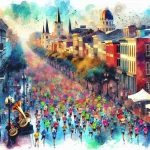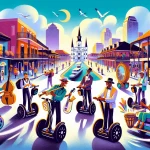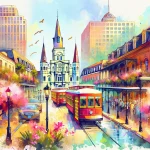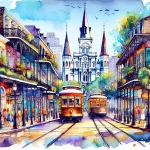Spanning nearly 3 miles from the Mississippi River to the edge of City Park, Esplanade Avenue is a captivating thoroughfare that highlights the rich history and cultural fabric of New Orleans. With its breathtaking architecture, tree-lined median, and an array of exceptional attractions, Esplanade Avenue is a must-visit destination for travelers seeking to experience the authentic charm of the Crescent City.
In This Article
TL;DR
- Esplanade Avenue is a historically significant and culturally diverse avenue showcasing architectural gems from various eras.
- Major seasonal events like the Crescent City Classic and the Rock ‘n’ Roll Mardi Gras Marathon take place along the avenue.
- Visitors can explore unique attractions such as the New Orleans Jazz Museum, the Edgar Degas House, local restaurants, and shops.
Historical Significance of Esplanade Avenue
The development of Esplanade Avenue began in the 1830s when it was extended from the river’s edge through former plantations to Bayou St. John. Originally envisioned as a transportation corridor and residential area for the city’s Francophone elite, Esplanade Avenue quickly transformed into a bustling thoroughfare lined with ornate mansions, modest shotgun houses, and charming Creole cottages.
Throughout its history, Esplanade Avenue has been associated with notable figures and events. The celebrated French Impressionist painter Edgar Degas stayed with his American family in a two-story townhouse on the avenue for several months in 1873, where he painted some of his most famous works.
Architectural Marvels Along Esplanade Avenue
Esplanade Avenue is renowned for its variety of architectural styles, ranging from grand Italianate mansions to quaint Creole cottages. Visitors can admire the intricate details of these historic homes, many of which feature high windows, lofty ceilings, and wrought iron fences surrounding manicured lawns and gardens.
Degas House
One notable example is the Degas House, built in 1852 and once home to the famous French Impressionist painter Edgar Degas. Today, the house operates as a bed and breakfast and mini-museum, offering visitors a glimpse into the life and work of the renowned artist.
Cultural Fabric of Esplanade Avenue
The development of Esplanade Avenue has been influenced by various cultures, creating a rich tapestry of art, music, and community events. The avenue forms part of the boundary between the Treme neighborhood and the city’s Seventh Ward, formerly a multigenerational Creole enclave.
Visitors can explore this cultural heritage at institutions like the New Orleans Jazz Museum at the Old U.S. Mint, which hosts live concerts by both traditional jazz legends and contemporary artists. The nearby Community Book Center serves as a cultural hub, specializing in African literature and offering a variety of community events.
Seasonal Festivals on Esplanade Avenue
Esplanade Avenue is a popular route for several key foot races, including the Crescent City Classic and the Rock ‘n’ Roll Mardi Gras Marathon, thanks to its multitude of shady oak trees that offer respite from the hot sun. These annual events draw thousands of participants and spectators, contributing to the vibrant atmosphere and cultural richness of New Orleans.
The Crescent City Classic, a 10K race, takes place every April, starting in Downtown New Orleans and finishing at City Park. The Rock ‘n’ Roll Mardi Gras Marathon, held annually in February, features live music along the route and a post-race festival celebrating the city’s musical heritage.
Dining and Cuisine on Esplanade Avenue
Esplanade Avenue is home to a variety of restaurants that showcase the flavors and culinary traditions of New Orleans. Visitors can indulge in classic French cuisine at Café Degas (3127 Esplanade Ave, New Orleans, LA 70119; (504) 945-5635), named after the famous painter who once resided nearby. The café offers an intimate dining experience with indoor and outdoor seating, serving dishes like escargot, moules frites, and steak frites.
For a taste of authentic Caribbean cuisine, head to Coco Hut (2515 Bayou Rd, New Orleans, LA 70119; (504) 945-8788), where you can enjoy specialties like jerk chicken, curry goat, and oxtail stew. The restaurant’s casual atmosphere and friendly service make it a favorite among locals and visitors alike.
Art and Music Scene
Esplanade Avenue is a hub for art and music, with numerous galleries, studios, and music venues dotting the thoroughfare. The New Orleans Jazz Museum at the Old U.S. Mint (400 Esplanade Ave, New Orleans, LA 70116; (504) 568-6993) is a must-visit destination, offering exhibits on the history of jazz and live performances by local and international artists. Admission to the museum is $8 for adults, $6 for seniors, and free for children under 12.
Just off Esplanade Avenue, Frenchmen Street is a two-block-long music and entertainment district that comes alive at night with live performances at venues like The Spotted Cat Music Club (623 Frenchmen St, New Orleans, LA 70116; (504) 943-3887) and d.b.a. (618 Frenchmen St, New Orleans, LA 70116; (504) 942-3731). These intimate clubs showcase the best of New Orleans’ jazz, blues, and funk scene, with no cover charge and affordable drink prices.
Shopping and Local Businesses
Esplanade Avenue is lined with unique shops and boutiques that offer a taste of local culture and craftsmanship. The Esplanade Ridge/Faubourg St. John section of the avenue features a small commercial district with a coffee shop, health food store, and several other small businesses.
One notable shop is the Community Book Center (2523 Bayou Rd, New Orleans, LA 70119; (504) 948-7323), which specializes in African literature and also offers fabrics, clothing, jewelry, and body products. The store serves as a cultural hub, hosting book signings and seminars that celebrate the community’s heritage.
Practical Tips for Visitors
The best times to visit Esplanade Avenue depend on your interests and the activities you wish to pursue. For comfortable weather and fewer crowds, plan your visit during the spring (March to May) or fall (October to November) months. If you’re interested in attending festivals like the Crescent City Classic or the Rock ‘n’ Roll Mardi Gras Marathon, be sure to check the event dates and plan accordingly.
To navigate Esplanade Avenue, visitors can take advantage of various transportation options. The Jackson-Esplanade Bus 91 runs along the avenue, providing easy access from Uptown New Orleans. Bicycling is another popular way to explore the area, with bike lanes and ample parking available along the route. For those driving, be mindful of parking restrictions and meter limits.
Enhancing the Visitor Experience
To fully immerse yourself in the history and culture of Esplanade Avenue, consider taking a guided tour or attending a local event. The Edgar Degas House (2306 Esplanade Ave, New Orleans, LA 70119; (504) 821-5009) offers intimate guided tours that provide insight into the life and work of the famous French Impressionist painter. Tours are available Wednesday through Sunday, with prices starting at $15 for adults and $13 for seniors and students.
Another way to engage with the local community is by attending events at the New Orleans Jazz Museum or the Community Book Center. These establishments regularly host book signings, seminars, and live performances that celebrate the rich cultural heritage of the area.
By exploring the historical landmarks, architectural marvels, and vibrant cultural scene along Esplanade Avenue, visitors can gain a deeper appreciation for the unique character and enduring spirit of New Orleans. Whether you’re a history buff, an art enthusiast, or simply looking to immerse yourself in the authentic charm of the Crescent City, Esplanade Avenue offers an unforgettable experience that will leave you enchanted and inspired.






